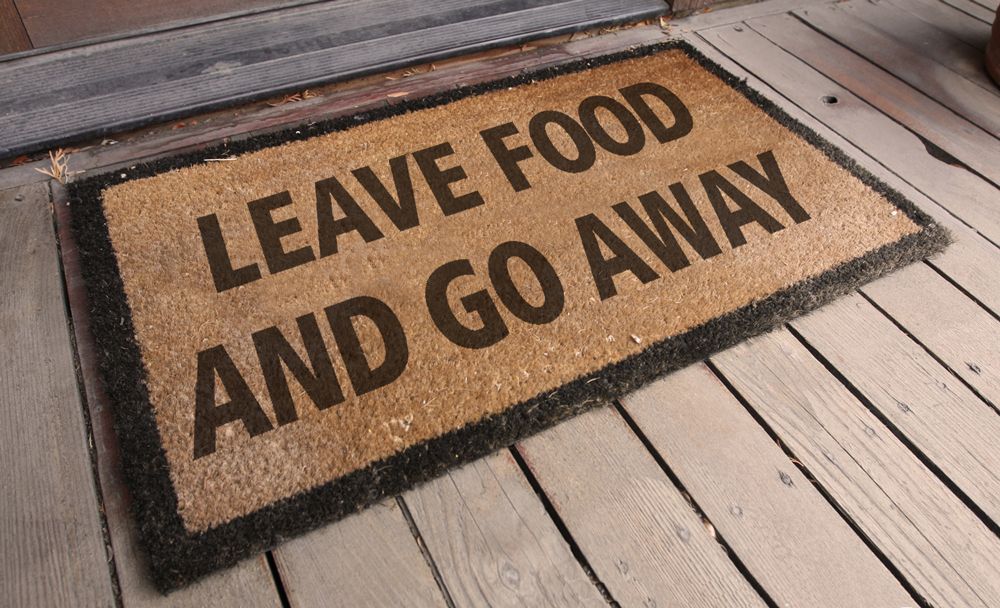When a baby arrives, it doesn't just change your immediate family dynamic – it shifts the entire extended family structure. Suddenly, parents become grandparents, siblings become aunts and uncles, and everyone seems to have an opinion about how you should be doing things. That's why setting healthy boundaries with your family isn't just nice – it's essential for your sanity and the well-being of your new family.
While I don't want to dismiss how difficult it can be dealing with your parents (or other family members), dealing with in-laws often adds an extra layer of diplomacy that makes it especially challenging. Here are some tips and language to help navigate these tricky waters.
For the record, I'm not legally responsible if you actually say the "you could say" suggestions – those are meant for your inside voice. ::snort::
1. The Surprise Pop-In
You're finally getting your baby down for a nap after what feels like hours, you haven't showered in days, and suddenly the doorbell rings. Your in-laws are standing there with big smiles, ready to see the baby.
You could say: "Really? How the fuck did you raise a child and still have zero understanding of how children work? We are tired and it is like a goat rodeo in here. Don't drop in on us. EVER!"
Or you could say: "We absolutely love that you want to spend time with the baby! Could you give us a quick call before coming over? Sometimes we're in the middle of naptime or I've just gotten the baby down, and a heads-up would help us make sure it's a good time for everyone."
2. The Grandparent Competition
It's surprisingly common for there to be a bit of scorekeeping between grandparents. "Well, her parents got to see the baby three times last week, and we've only been over once!"
You could say: "I'm sorry, I'm only able to take care of one baby right now. I am running on 16 minutes of sleep and you expect me to dish out visits like dividing M&Ms between toddlers. Suck it up buttercup, if you want to see the baby more, you need to suck less."
Or you could say: "We really value the relationship you're building with the baby. Every moment spent together is important, and we're doing our best to make sure everyone gets quality time."
3. The Parenting Critics
The unsolicited advice can be overwhelming, whether it's about breastfeeding vs. formula, sleep training, or how you dress your baby.
You could say: "Hey, you've had your turn at raising kids. For the record, I've seen your handiwork and I'm not that impressed."
Or you could say: "Thanks for sharing your experience! Parenting methods have changed quite a bit over the years, and we're following what our pediatrician recommends for us. But I appreciate you caring so much about the baby."
4. The "We Did It This Way" Syndrome
Your mother-in-law insists on swaddling the baby her way. Your father-in-law thinks the baby should be wearing a hat indoors. For non-safety issues, sometimes it's easier to let things slide. But you need to chime in when it matters to you.
You could say: "How about we all take care of our own children. I'll take care of mine while you shop for a much bigger swaddle."
Or you could say: "I know you raised wonderful children with your methods. Some things have changed based on new research, though. Would you mind if I show you how we're doing it now? I'd love for you to be familiar with our routine."
5. "Help" That Isn't Helpful
There's nothing quite like an in-law who comes over to "help" but ends up creating more work for you. Maybe they reorganize your kitchen while you're trying to establish a feeding schedule, or they hold the baby while you cook and clean.
You could say: "Should the headline read 'new parent walks into the ocean while surrounded by unhelpful chaos' or just let the reporters and police figure it out?"
Or you could say: "You know what would be incredibly helpful right now? If you could handle dinner while I feed the baby. That would be such a relief for us."
6. The Marathon Visit
Some in-laws don't seem to have a sense of when it's time to leave, which can be exhausting when you're already running on fumes.
You could say: "Welp, it's getting late." *Slap knee, turn the lights off, and go to bed.
Or you could say: "Mom and Dad, we've loved having you, but I/we/the baby needs to rest now, and we need some time as just our little family. Could we plan for a shorter visit next Thursday instead?"
Setting Boundaries Without Starting a Family Feud
Setting boundaries isn't selfish – it's incredibly important for everyone involved. Whether that means limiting visitors for the first two weeks or asking people to wash their hands before holding the baby, you and your baby's needs matter most right now.
Start Early with Clear Expectations
Before the baby even arrives, have conversations about your expectations for visits. "We're thinking we'll need about two weeks to get our bearings before we have visitors. After that, we'd love to set up some regular times for you to come meet the baby."
The Power of Positive Framing
Instead of "Don't come over unannounced," try "We'd love to make sure we're fully present when you visit, so a heads-up call would be great!" It's amazing how much smoother things go when people don't feel attacked.
Tag-Team with Your Partner
Your partner should be running interference with their own parents. There's something about hearing boundaries from their own child that makes parents more receptive. And frankly, any friction between you and their parents is your partner's issue to resolve, not yours.
Create a Visiting Schedule That Works for YOU
Having set visiting hours might sound formal, but it can be a lifesaver. "We've set aside Saturdays from 2-4 PM for visitors. We'd love to see you then!" This gives you predictability during an otherwise unpredictable time.
Play to Their Strengths
Is your father-in-law great at fixing things? Ask him to assemble the baby swing. Is your mother-in-law a fantastic cook? Perhaps you could ask what she thinks are the best freezer meals to prepare. People feel valued when their specific talents are recognized.
Finding Your Balance
At the end of the day, managing in-law relationships after having a baby is about communication, compassion, and consistency. Yes, there will be awkward conversations. Yes, there might be some butt hurt feelings. But with time, most families find their rhythm.
Remember that your in-laws are experiencing a major life transition too. They're figuring out their new roles as grandparents just as you're learning to be parents. With clear boundaries and gentle guidance, you can foster relationships that enrich your child's life while preserving everyone's sanity.
After all, it really does take a village – just one with some well-communicated ground rules.
Also check out: 10 Tips for Handling Visitors After Birth




Leave a Comment